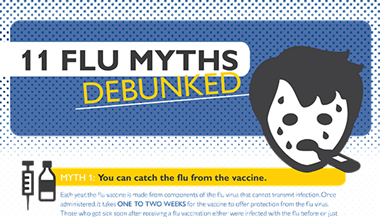How Do you Tell the Flu from a Cold?
Featured Expert
In the winter, people are on the move across the country to spread good cheer … but there is something else that they might be bringing with them, and it’s the flu. So we often hear about “having the flu” but how is that different from a common cold? Patrick Mularoni, M.D., at Johns Hopkins All Children’s Hospital explains the differences.
Influenza, the virus that causes flu, actually has a season where it is most common, and we are in time of year when flu spreads across the United States just like travelers who are going home for the holidays. Influenza is much like the thousands of viruses that cause the common cold but typically patients with the common cold can still function pretty well. When you get the flu, you can’t or don’t want to get out of bed. When we are trying to compare the symptoms to determine whether you have the flu or a common cold, both will have runny nose, cough and even fever but with the flu, these symptoms are usually worse. Patients with the flu also will complain of body aches, fatigue, and typically run fevers for multiple days.
So the flu makes you feel worse, but is it more dangerous than the common cold?
Flu causes inflammation in the lungs. The very young and very old are at increased risk to develop pneumonia when they get the flu. Most children can handle the infection, but those with cerebral palsy, lung diseases such as cystic fibrosis or even asthma are susceptible to secondary bacterial infections that lead to hospitalizations. Flu is a bad actor and although flu deaths are higher in individuals at the extremes of age and those with chronic medical problems, it also can lead to death in previously healthy kids and this is the reason why we have a vaccine and why it is recommended for everyone over 6 months old.
If a family is planning on traveling over the holidays, how do they know if they are going to an area that has flu right now?
The Centers for Disease control produce a map that shows where flu is the most prominent. The most important thing to know is that if you are travelling, especially by plane, you are likely to travel through an area with flu and when travelling you are likely to encounter someone who has been in an area with higher flu activity.
What’s the best way to avoid flu?
Influenza is a highly contagious illness that is spread when someone with the virus coughs or sneezes, sending particles into the air and onto surfaces where we pick them up. Proper hygiene is a good way to avoid it. Also if you’re flying with little ones, you should wipe down seats and tray tables when you get onto the plane. Another important tip is that anyone over the age of 6 months should get vaccinated now before the infection is widespread in our area. Get yourself vaccinated to not only protect yourself but also those people you encounter in your community.
General Pediatrics at Johns Hopkins All Children's Hospital
The General Pediatrics clinic has two locations, at our main campus Outpatient Care Center in St. Petersburg, and Outpatient Care.







